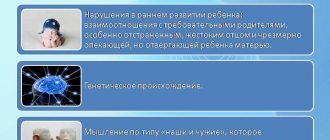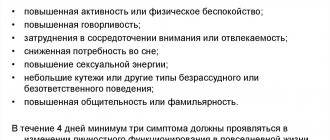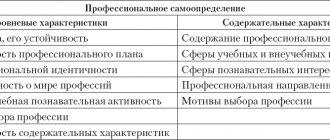When does postpartum psychosis occur?
Before giving birth, the behavior of this woman sometimes does not cause any particular concern: who among the expectant mothers is not familiar with the feeling of excitement, anxiety, fear, or sleep disturbance as the due date approaches? Acute postpartum psychosis occurs within the first month after the birth of the child.
The main problems begin during the delivery process. But it can be debilitating, long and accompanied by complications. A woman may lose a large amount of blood or contract a postpartum infection. Changes in the psyche are not immediately visible; they can appear after several days, and sometimes weeks. But often, after returning from the maternity hospital, a woman looks depressed, her mood is changeable, and her attitude towards the child and others varies from indifferent to aggressive.
Schizophrenia symptoms and signs in women
Schizophrenia in women is presented as a complex mental illness, which manifests itself primarily as a change in personality due to a schizophrenic defect with a polymorphic clinical picture.
According to medical statistics, this disease is diagnosed much more often among men, but among women the manifestations are more complex and severe - the social and emotional sphere of the individual is completely destroyed.
Often the disease can have a sluggish form, periodically it worsens. Against the background of this state, the importance of the family decreases, and one’s own children are rejected.
Causes of mental disorders after childbirth
The following causes and factors may influence the development of psychosis in women who have recently given birth:
- hereditary tendency, if close relatives (mother, grandmother) suffered from a similar disorder;
- excessive physical stress during childbirth against the background of hormonal changes in the body of a young mother;
- long and difficult labor, severe bleeding, protein metabolism disorders, dehydration, liver dysfunction, sudden changes in blood pressure;
- severe fatigue, lack of sleep, psychologically uncomfortable family environment, woman’s unpreparedness for increased workload during the first time of motherhood;
- past experiences of mental trauma or physical damage to the head associated with brain function;
- the woman has a psychiatric diagnosis, including a history of depressive personality disorder, schizophrenia, and bipolar affective disorder.
Mental distress is often caused by depletion of physical strength after childbirth. There is another relationship: severe pregnancy and childbirth, which can subsequently provoke psychosis, more often affects women with a fragile psychological constitution. This applies to women with a hysterical or depressive personality type, with a tendency towards hypochondria.
Causes
The causes of postpartum psychosis include the following somatic and psychogenic factors:
- burdened heredity (when one of the close relatives suffered from a mental illness) is fertile ground for the development of this disorder;
- during childbirth, a woman is exposed to intense physical stress, in addition to this, significant hormonal changes and vegetative changes occur, which can also lead to postpartum psychosis;
- prolonged and difficult labor, blood loss, protein shifts, dehydration, liver dysfunction, changes in blood pressure can also affect a woman’s mental state;
- overwork, lack of sleep, a traumatic situation in the family, observed in the postpartum period, as well as the woman’s unpreparedness to perform maternal responsibilities;
- some personal qualities (increased suspiciousness, anxiety, characteristic of psychasthenia), severe mental and traumatic brain injuries suffered in the past.
Symptoms of postpartum psychosis
Initial signs of the disorder may appear as early as the first postpartum week. Despite chronic fatigue and weakness, the young mother suffers from insomnia. She begins to be chronically tormented by concerns about the baby, such as: she doesn’t have enough milk, the baby is malnourished, or something constantly hurts.
The condition is rapidly progressing, which is outwardly expressed by the mother’s pathological agitation, her excessive activity, and the expression of doubts about whether the baby is hers, whether the children were mixed up in the maternity hospital, or whether the child could be taken away from her. Unnatural excitement alternates with periods of sudden loss of strength and lack of mood. Sometimes a woman completely loses interest in the baby and stops caring for him.
The further behavior of the young mother, especially in relation to the newborn, is increasingly alarming. A woman can ignore the baby, refusing to accept him as her own, or, on the contrary, not part with him for a second and not let other relatives near the baby. She may be suspicious of others, fearing that they intend to harm the baby, steal him or take his life (obsessive fears). Psychiatrists classify this behavior as delusion.
A woman may unreasonably feel that the baby is sick, and therefore she begins to voluntarily treat him with drugs that may pose a danger to the health and life of the baby. In severe cases, auditory or visual hallucinations develop, under the influence of which a young mother can behave aggressively with others and put her child in physical danger.
The patient may develop amentia syndrome, in which the person becomes confused, loses coherent speech, shows signs of excessive excitement, and his movements are erratic. In the absence of medical care, postpartum psychosis in women can end unpredictably. The woman's condition requires hospitalization and immediate treatment. Under no circumstances should these symptoms be ignored. In such a situation, constant monitoring of the woman by someone close to her is necessary in order to avoid a threat to the life and health of the baby and the mother herself.
How to recognize the disease?
The patient is not able to make a diagnosis for herself: as a rule, she believes that everything is fine with her, it’s just that for some reason the people around her are behaving inappropriately. Therefore, family and friends should be concerned about the strange behavior of the young mother. Relatives must convince the patient to go to the doctor.
Where does it all begin?
The clinical picture of the disease is varied; some women exhibit individual symptoms.
The first signs of psychosis after childbirth are usually:
- The woman is constantly in a bad mood, which intensifies in the morning. Outbursts of aggression are abruptly replaced by a depressed state.
- Sleep is disturbed and she constantly feels tired.
- Loses the thread of conversation, cannot clearly express thoughts, speech is incoherent.
- Wakes up early, no appetite.
- He is tormented by a feeling of guilt, ascribes to himself non-existent sins.
- Unable to make decisions, even simple ones.
- Panicks about the child's health, although the baby gives no reason for concern.
- Yells at the baby, which annoys the woman.
It happens that postpartum psychosis proceeds sluggishly: insomnia, lack of appetite, always in a bad mood - that’s all. Perhaps this condition is nothing more than postpartum depression, which affects approximately every seventh woman who has given birth. A few weeks later, the young mother comes to her senses: her mood rises, life gets better.
It is much more difficult to get out of a state of psychosis, the main characteristic of which is manic syndrome.
Acute form
If a woman has had a difficult birth and is also giving birth for the first time, the nervous system may not be able to withstand the physical and psychological stress and may fail. An emotional decline sets in. At first, the mother’s suppressed feelings do not cause anxiety: the mother in labor had a hard time, but gradually she will come to her senses. However, after two weeks, negative emotions finally take precedence over the feeling of joy from motherhood. The woman's behavior becomes inexplicable. There is acute psychosis, the symptoms of which are:
- indifference to the child, in the worst case - aggression towards the child; When the baby is indifferent to the mother, the woman may be susceptible to postpartum psychosis
- rudeness in communicating with relatives, accusing them of trying to harm the child;
- delusions, hallucinations, mainly auditory;
- manic thoughts about criminals who want to steal or kill the baby;
- an obsessive desire to cure a child of diseases that do not exist - in this case, the mother can use strong medications that can make the baby disabled.
When conversations begin about wanting to commit suicide, rest assured: the patient requires urgent medical attention. It is important to foresee such a development of events and in advance, by hook or by crook, to lure the woman into the psychiatrist’s office.
Schizophrenic psychosis after childbirth
Sometimes they try to cure mental disorders after childbirth with the help of hormonal medications. In some cases, such therapy leads to the development of schizophrenic psychosis, the most dangerous form of the disease. Signs:
- the woman is constantly gripped by panic fears; Manic fear follows on the heels of a psychotic patient, not giving respite
- may attempt suicide;
- the patient is visited by thoughts of the need to get rid of the child;
- delirium, hallucinations - as a result, the woman is not responsible for herself and is capable of throwing a newborn out of the window.
When the insanity passes, the patient will not even remember what she did. The human psyche has not yet revealed all its secrets to researchers, so it is difficult to imagine how it is possible for a mother to kill her own child. To prevent a terrible outcome, it is necessary, even at the stage of the first panic, to isolate the mentally ill woman from the child, and then take her to the doctor. Prompt medical care provided to the mother will likely save the baby's life.
Treatment of postpartum psychosis
The described condition will not go away on its own; you need to see a doctor as soon as possible. Contact a psychiatrist for a solution to the problem of how to get out of postpartum psychosis. After studying the symptoms, the doctor will prescribe medication using drugs from the following groups:
- antipsychotics (Aminazine, Triftazin, Haloperidol) - eliminate delirium, relieve hallucinatory phenomena, movement disorders associated with psychopathological syndrome;
- antidepressants (Fluoxetine, Amitriptyline) - reduce depression (apathy, anxiety, melancholy) by regulating the level of dopamine, serotonin and norepinephrine, which are neurotransmitters;
- mood stabilizers (Carbamazepine, sodium valproate) - eliminate mood swings in people with affective disorders, including bipolar, schizoaffective, and major depressive.
In parallel, it is necessary to treat concomitant conditions (infectious pathologies or complications, somatic diseases) that worsen the course of the disorder. It is necessary to provide the young mother with a comfortable psychological atmosphere in the family.
Consequences
If treatment is not started on time, the consequences of this terrible disease can be disastrous. Being in a state of psychosis, a woman does not control her actions and is captive of obsessions. There are cases where a mother who had just given birth, not receiving timely treatment and being in a manic-depressive state, attempted suicide. And not all of them, unfortunately, were prevented.
A friend of mine who suffered postpartum psychosis remembers that time as a bad dream. Her birth was premature and difficult, which obviously contributed to the development of the disease.
She says that she suddenly became irritable, shouted at everyone, and everyone suddenly became enemies. I even got into a fight with my mother-in-law. She wrote some vague, incomprehensible notes. Everything around me became alien, life seemed over. It seemed to her that her vitality had left her. The sense of taste was completely gone. Because of this, she refused to eat in the hospital. They force-fed her with a spoon. I don’t remember at all how I ended up in the hospital. The treatment dragged on for six months.
Three years have passed, and she and her husband want a second child. But my friend is afraid of a recurrence of the disease. So she and her husband turned to the psychiatrist who treated her. Now the woman is following all the doctor’s recommendations and hopes that the terrible disease will not happen again.
If you could not avoid the disease, and postpartum psychosis still manifests itself, do not despair. Remember - life goes on. It is very important to be attentive to a woman who has recently given birth. Take care of her, help with household chores. Surround her with love. Give mommy the opportunity not to be overworked and to rest more often. And then the terrible illness will recede and will be remembered simply as a severe nightmare.
Prevention of psychosis after childbirth
Timely treatment ensures complete recovery in 75% of cases. But it is worth considering the consequences of postpartum disorder in women who chronically suffer from one or another type of mental disorder or have a family tendency to this kind of abnormality. In these cases, pregnancy and childbirth only play the role of a provoking factor in the development of pathology. In the future, this category of patients may experience relapses of exacerbations of the underlying disease, so it is important, together with the doctor, to develop and adhere to effective treatment tactics.
Prevention is based on training and preparing the expectant mother for bearing a child and the process of childbirth, morally and physically. A woman should have an adequate idea of what awaits her during pregnancy and after the birth of the child.
To minimize the risks of complications, doctors strongly recommend attending specialized courses for pregnant women, learning proper breathing and relaxation techniques during childbirth, and seeking psychological help from family and friends. If pathological anxiety occurs, you should consult with specialists.
Types of postpartum depression
In medical practice, a certain classification of postpartum depression has been adopted. With neurotic depression in a woman, those disorders that occurred during pregnancy become aggravated. She is depressed, often cries, and gradually reaches an extreme degree of nervous exhaustion .
Traumatic neurosis , as a rule, appears after a very difficult birth process. In women who have experienced a difficult birth, before the next birth of a child, a state of anxiety and obsessive fears gradually increases.
With melancholy, which is accompanied by delusional inclusions , the woman’s condition is characterized by severe lethargy, a feeling of guilt, as well as thoughts of her own failure. A woman may not recognize people close to her and suffer from the constant manifestation of unpleasant hallucinations. Very often, this condition precedes the manifestation of manic-depressive psychosis .
With postpartum depression with a neurotic component, a woman may experience symptoms of a hypochondriacal nature, as well as insomnia and a feeling of powerlessness. The mother is constantly afraid of harming her child in some way.
Most often, young mothers experience a prolonged course of postpartum depression. Moreover, this condition very often goes undiagnosed in women, although approximately 20% of young mothers suffer from it. Symptoms of this condition include a constant feeling of fatigue, despondency, and exhaustion. It is very difficult for a mother to tolerate the baby's crying; she becomes irritable, and at the same time constantly feels guilty for such behavior.











